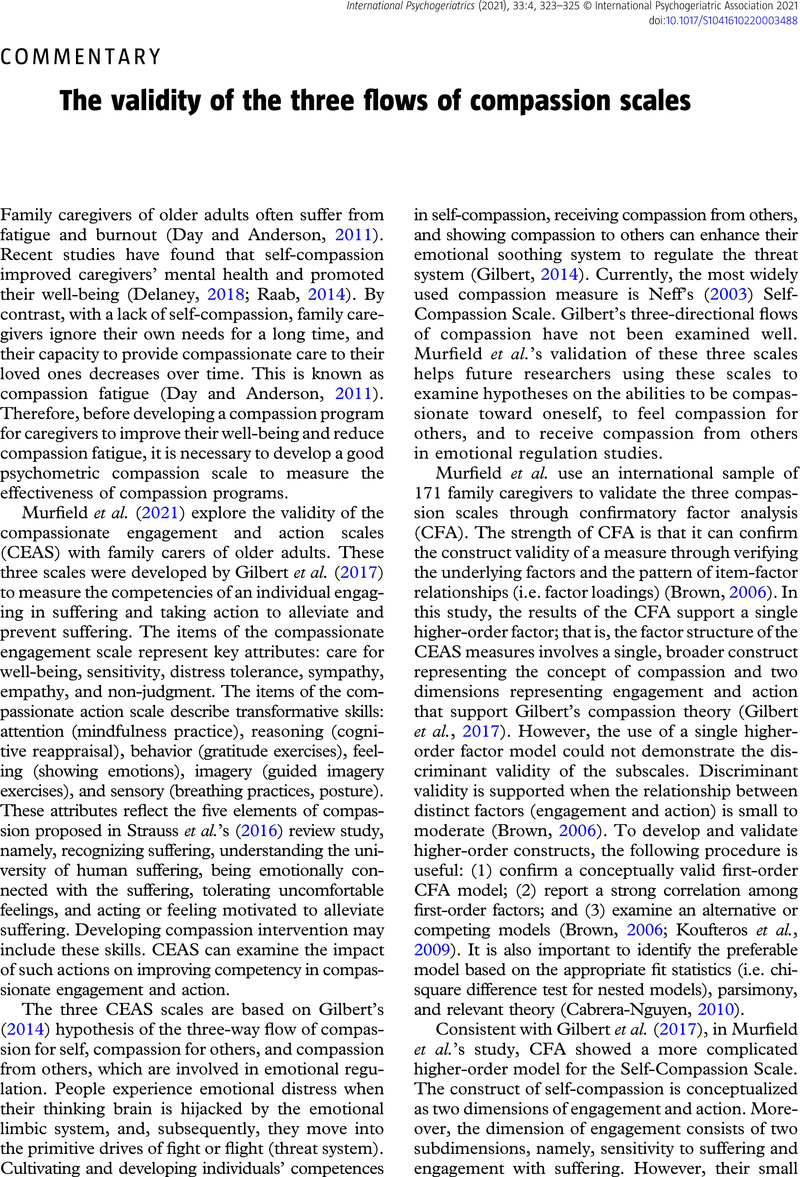No CrossRef data available.
Article contents
The validity of the three flows of compassion scales
Published online by Cambridge University Press: 10 May 2021
Abstract
An abstract is not available for this content so a preview has been provided. Please use the Get access link above for information on how to access this content.

- Type
- Commentary
- Information
- International Psychogeriatrics , Volume 33 , Special Issue 4: Issue Theme: Caring for Caregivers of People with Dementia , April 2021 , pp. 323 - 325
- Copyright
- © International Psychogeriatric Association 2021
References
Allen, A. B. and Leary, M. R. (2010). Self-compassion, stress, and coping. Social and Personality Psychology Compass, 4(2), 107–118. https://doi.org/10.1111/j.1751-9004.2009.00246.x
CrossRefGoogle ScholarPubMed
Brown, T. A. (2006). Comfirmatory Factor Analysis for Applied Research. New York: Guilford Press.Google Scholar
Cabrera-Nguyen, P. (2010). Author guidelines for reporting scale development and validation results Journal of the Society for Social Work and Research, 1(2), 99–103.CrossRefGoogle Scholar
Day, J. R. and Anderson, R. A. (2011). Compassion fatigue: An application of the concept to informal caregivers of family members with dementia. Nursing Research and Practice, 2011, 1–10. https://doi.org/10.1155/2011/408024
CrossRefGoogle ScholarPubMed
Delaney, M. C. (2018). Caring for the caregivers: Evaluation of the effect of an eight-week pilot mindful self-compassion (MSC) training program on nurses’ compassion fatigue and resilience. PLoS ONE, 13(11), e0207261. https://doi.org/10.1371/journal.pone.0207261
CrossRefGoogle ScholarPubMed
Gilbert, P. (2014). The origins and nature of compassion focused therapy. British Journal of Clinical Psychology, 53(1), 6–41. https://doi.org/10.1111/bjc.12043
CrossRefGoogle ScholarPubMed
Gilbert, P. et al. (2017). The development of compassionate engagement and action scales for self and others. Journal of Compassionate Health Care, 4(4), 1–24.CrossRefGoogle Scholar
Gilbert, P., McEwan, K., Catarino, F. and Baião, R. (2014). Fears of compassion in a depressed population: Implication for psychotherapy. Journal of Depression and Anxiety, S2, 1–8.Google Scholar
Gu, J., Cavanagh, K., Baer, R. and Strauss, C. (2017). An empirical examination of the factor structure of compassion. PLoS ONE, 12(2), e0172471. https://doi.org/10.1371/journal.pone.0172471
CrossRefGoogle ScholarPubMed
Hermanto, N. et al. (2016). Ability to receive compassion from others buffers the depressogenic effect of self-criticism: a cross-cultural multi-study analysis. Personality and Individual Differences, 98, 324–332.CrossRefGoogle Scholar
Hsieh, C. C., Yu, C. J., Chen, H. J., Chen, Y. W., Chang, N. T. and Hsiao, F. F. (2019). Dispositional mindfulness, self-compassion, and compassion from others as moderators between stress and depression in caregivers of patients with lung cancer. Psycho-Oncology, 28, 1498–1505.CrossRefGoogle ScholarPubMed
Koufteros, X., Babbar, S. and Kaighobadi, M. (2009). A paradigm for examining second-order factor models employing structural equation modeling. International Journal of Production Economics, 120(120), 633–652.CrossRefGoogle Scholar
Lopez, A., Sanderman, R., Ranchor, A. V. and Schroevers, M. J. (2018). Compassion for others and self-compassion: Levels, correlates, and relationship with psychological well-being. Mindfulness, 9(1), 325–331. https://doi.org/10.1007/s12671-017-0777-zCrossRefGoogle ScholarPubMed
Murfield, J., Moyle, W., O’Donovan, A. and Ware, R. (2021). Validity of the Compassionate Engagement and Action Scales with family carers of older adults: confirmatory factor analyses. International Pyschogeriatrics, 33, 373–383. doi: 10.1017/S1041610220001738.Google Scholar
Neff, K. (2003). Self-compassion: an alternative conceptualization of a healthy attitude toward oneself. Self and Identity, 2, 85–101.CrossRefGoogle Scholar
Raab, K. (2014). Mindfulness, self-compassion, and empathy among health care professionals: a review of the literature. Journal of Health Care Chaplaincy, 20(3), 95–108. https://doi.org/10.1080/08854726.2014.913876CrossRefGoogle ScholarPubMed
Strauss, C. et al. (2016). What is compassion and how can we measure it? A review of definitions and measures. Clinical Psychology Review, 47, 15–27. https://doi.org/10.1016/j.cpr.2016.05.004CrossRefGoogle ScholarPubMed


